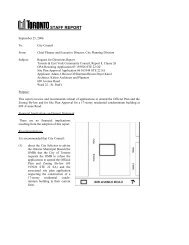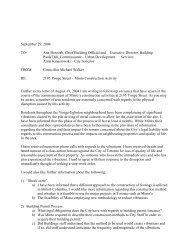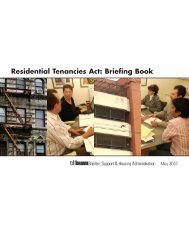Residential Tenancy Reform Consultation Paper
Residential Tenancy Reform Consultation Paper - Michael Walker
Residential Tenancy Reform Consultation Paper - Michael Walker
You also want an ePaper? Increase the reach of your titles
YUMPU automatically turns print PDFs into web optimized ePapers that Google loves.
Demolition and conversion<br />
RESIDENTIAL TENANCY REFORM CONSULTATION PAPER<br />
The government has stated it wants to ensure that<br />
municipalities with low vacancy rates have the right to<br />
protect existing rental housing from unreasonable demolition<br />
or conversion to condominiums.<br />
Many municipalities have sought control over the demolition<br />
and conversion of existing rental housing stock in<br />
order to protect affordable rental housing. They argue that<br />
current higher vacancy rates may be temporary, caused by<br />
factors such as a shift of renter households to ownership<br />
or by higher rents that have reduced the number of new<br />
renter households. They believe there is a need to protect<br />
existing rental housing stock since little new rental housing<br />
is being built, particularly at affordable rent levels.<br />
However, many landlords and developers argue that controls<br />
on demolitions and conversions restrict the “best and<br />
highest use of land.” They are against restrictions that<br />
could prevent them from earning a better rate of return<br />
on the land and structure in another use (for example, as<br />
a condominium or redeveloped as a commercial space.)<br />
Background:<br />
Rental Housing Protection Act<br />
The former Rental Housing Protection Act (RHPA), enacted<br />
in 1986, required landlords to apply to their municipal<br />
council for approval if they wanted to convert, demolish<br />
or make major renovations to a rental property. In general,<br />
these rules applied to buildings with five or more units in<br />
municipalities with a population greater than 50,000 and<br />
in the case of a proposed conversion to condominium<br />
these rules applied to all rental properties in all municipalities.<br />
The RHPA was repealed in June 1998 as the Tenant<br />
Protection Act, 1997 (TPA) came into effect. The TPA does<br />
not include a municipal approval process for conversions<br />
and demolitions.<br />
In demolition situations the TPA requires landlords to provide<br />
compensation to tenants that is equal to three months rent<br />
or to provide another apartment for the tenant to live in<br />
that the tenant accepts (this applies to buildings with five<br />
or more units). In conversion situations, the TPA states that<br />
a tenant can continue to live in their rental unit for their<br />
entire life after the building becomes a condominium, and<br />
the tenant has the right of first refusal to purchase their<br />
apartment if it is sold.<br />
Official Plan policies<br />
Many municipalities in Ontario have policies governing<br />
condominium conversions and/or demolitions. Generally,<br />
these policies are part of the Official Plans of those municipalities.<br />
Subsection 16 (1) (a) of the provincial Planning Act<br />
provides that an official plan shall contain “goals, objectives<br />
and policies established primarily to manage and direct<br />
physical change and the effects on the social, economic<br />
and natural environment of the municipality or part of it...”<br />
Official Plan policies use a range of measures or criteria to<br />
evaluate proposed conversions or demolitions. These measures<br />
or criteria could include: vacancy rate thresholds that<br />
need to be met, limitations on buildings with high rent levels,<br />
requirements for replacement rental units of a similar<br />
type, consideration of the impact on the mix of housing<br />
options available, requirements for public meetings and<br />
requirements for the approval of the current tenants.<br />
Recently, after lengthy legal proceedings, the Court of Appeal<br />
for Ontario found that municipalities have the authority to<br />
set policies in their Official Plans concerning conversions to<br />
condominium and the demolition of rental housing.<br />
Although the Court of Appeal decision has clarified the<br />
authority of municipalities in this area, there continue to be<br />
situations where rental housing is not protected by policies<br />
in Official Plans. This is the case in situations where no<br />
planning approvals are needed. For example, the demolition<br />
of a five-storey rental residential building that is replaced<br />
by a five-storey co-ownership residential building may<br />
not need municipal planning approval. To be able to preserve<br />
rental housing in these situations, municipalities<br />
would need to be given authority through provincial legislation.<br />
26






